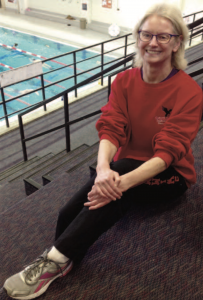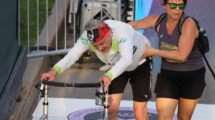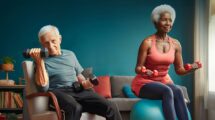Swimming is Lynn Marshall’s fountain of youth
By Martin Cleary | March/April 2019
Lynn Marshall has been a swimming champion and a champion for swimmers for almost half a century, up and down the pool lanes, straight as an arrow with arms churning, hundreds of thousands of times in training and competition.
And there appears to be no finishing touch pad in sight for this energetic and dedicated athlete. She has set dozens of world and hundreds of Canadian age-group records, inspired other mature adults as a coach and has been inducted as a masters honoree into the International Masters Swimming Hall of Fame.
Whether she’s in the water or on land, Marshall, 58, is having too much fun. Swimming is her fountain of youth. “It helps keep me young,” enthused the head of the Carleton University masters swimming program, the assistant coach and manager of the university’s varsity swim team and a sessional lecturer in software engineering at the institution.

“When I’m around younger ones, you forget you’re not that age, which is good. Age and gender do not define what you can do. I look forward to my milestone birthdays (every year divisible by five). I don’t dread them like others have. They are happy occasions and don’t define what you can do and not do.”
Every time Marshall celebrates a milestone birthday, it means she’s the youngest in her new age class (i.e. 55-59). That means she will likely be one of the fastest in her category and it’s her year to set new goals, have the best chance for more success and rewrite the record books.
Marshall knows about records. In her 33 years of swimming in masters competitions, which begins at age 25 in swimming, she has broken 253 Canadian age-group records. At the international level, Marshall figures she has broken about 60 world records.
When Marshall was young, her parents wanted her to take swimming lessons so she could safely enjoy the water at the family cottage near their Winnipeg home. Although not a fan of the training sessions as a competitive swimmer, Marshall represented Manitoba at the 1977 Canada Games and at national championships.
For 10 years, she swam at the intercollegiate level with Waterloo University, the University of Manchester while on a Commonwealth Scholarship, and Catholique de Louvain-La Neuve in Belgium, where she earned her respective BSc, Masters and PhD degrees. “I didn’t know much about masters swimming (in 1986) until a friend of mine said: ‘Hey, you’re 25, let’s go,’” said Marshall, explaining her awkward introduction to swimming’s popular masters’ discipline. “At my second competition, I set a masters world record. I didn’t even know they kept records.”
Marshall was hooked for all the right reasons, and not just chasing records or earning recognition. “It’s a very interesting group of people.There are hard-core swimmers, who have been doing it forever. Some do it for cross-training (in other sports). Then there are those who took it up late,” she added. “It’s something anyone can do.”
There are about 1,500 masters swimmers in the National Capital region in various clubs or programs, which have different entry criteria. For the Carleton masters program, Marshall said if someone with a swimming background wants to try out, they need to swim one kilometre in an hour and know how to do two of the four strokes (freestyle, breaststroke, backstroke and butterfly). If someone is not at that level, she recommends learn-to-swim classes or private lessons.
The benefits from this full-body workout are invaluable. “It’s a good stress relief. You can put everything out of your mind. The workouts can be stressful, but it’s a different kind of stress,” explained Marshall, who sees swim competitions not only as a chance to race, but also as opportunities to visit new cities and make new friends.
In 1993, her swimming career almost ended, when she was involved in a traffic accident while leading the cycling leg of her first triathlon in Kingston. She suffered a rare C1 vertebra fracture, which sidelined her for three months. During that injury time, she was able to stay fit by doing lifejacket-assisted water running and stretching instead of swimming. When she returned to swimming, the injury had impacted her physically but didn’t affect her motivation. “It (neck injury) changed my style in freestyle because it affected my neck mobility. My neck has not been the same as it was, but life goes on.” Marshall doesn’t compete in triathlons (swimming, cycling and running) anymore, but she did resume swimming and breaking age-group records.
And don’t expect her to stop anytime soon. As she’ll tell anyone new to the sport, it’s a lifetime sport that will give you the time of your life, whether it’s important physical exercise, a stronger cardiovascular system, more social time or a time to clear your mind. Even if you have pre-existing health issues, swimming workouts can be modified to benefit any swimmer.
“You can do it for many, many years,” she emphasized.“There’s a man in Winnipeg who went to 104 and set world records for certain events.” Jaring Timmerman set two world records in January 2014, before passing away less than 10 months later at age 105, the oldest masters swimmer in the world.






